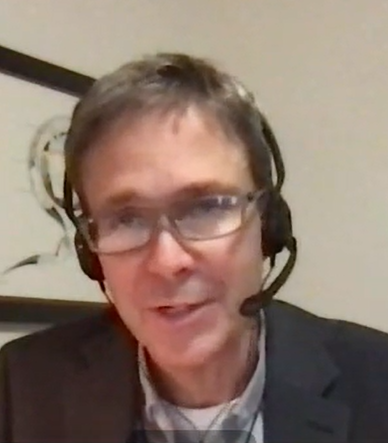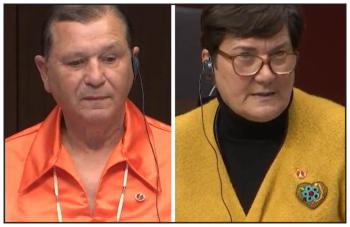Image Caption
Summary
Local Journalism Initiative Reporter
Windspeaker.com
An Alberta senator who sits on the Standing Senate Committee on Indigenous Peoples says oblates who are still alive and who worked at residential schools are “living archives” and should consider sharing their knowledge with Indian residential school survivors.
The idea was put forward last night by independent Senator Karen Sorenson as the Senate committee met to hear from representatives of OMI Lacombe Canada and Deschâtelets-NDC Archives. The testimony was part of the committee’s study on entities and organizations that have not yet released all records relating to children who attended Indian residential schools.
“I’m really struggling a lot with the fact that we have living personnel who, frankly, are living archives and those people must have very valuable information. We have residential school survivors with endless, vivid traumatic memories,” said Sorenson.
“I’m asking, is part of reconciliation, is part of recovering the archives interviewing living personnel, interviewing those living archives to collect and record information from their experiences at the same schools where we hear so often and tragically from the residential school survivors?” she said.

Sorenson’s suggestion took Father Ken Thorson by surprise. He is provincial superior of the Oblates of Mary Immaculate (OMI) Lacombe Canada. Oblates are a Roman Catholic order of priests and brothers.
“The image…of a living oblate as a living archive, it’s a compelling image and certainly there’s truth to that,” said Thorson. “I can’t speak for those oblates. I expect that some of the oblates who worked at the schools…may be open to those kinds of conversations.”
But Thorson warned that the oblates were elderly men and as such “vulnerable persons.” He said the idea would have to be discussed further with his colleagues and leadership in the congregation.
Members of OMI Lacombe Canada serve in parish, social justice and retreat ministries from Ontario to British Columbia and in the Northwest Territories.
Sorenson’s question was prompted by learning that the personnel files of living oblates would only be made available to Indigenous communities and researchers two years after they had passed away.
Thorson said that two-year stipulation was put in place after the 215 unmarked graves were identified at the Kamloops Indian residential school in 2021. Up until then, 50 years had to pass after death for oblate personnel records to be made available.
“Our commitment has been renewed and strengthened since May 2021, when the heartbreaking discoveries in Kamloops demonstrated both the pain felt by many survivors and the desire for a more complete account of residential school history,” said Thorson.
In July 2021, OMI Lacombe entered into an agreement with the National Centre for Truth and Reconciliation (NCTR). Since then, he said, more than 75,000 oblate records had been digitized and inventoried, which is on top of the 40,000 that were already shared as part of the Truth and Reconciliation Commission’s (TRC) process on Indian residential schools.
Thorson said that the most recent information transferred to NCTR included Codex Historicus, which are the oblates’ daily logs of life at residential schools. Those daily logs account for the happenings at 16 residential schools from 400 oblates who worked in residential schools with close to 1,000 students.
Thorson also said that OMI had agreements with four archives—Deschâtelets-NDC Archives (Quebec), the Centre du patrimoine in St. Boniface (Manitoba), Royal BC Museum and the Provincial Archives of Alberta—to transfer “relevant” residential school records to NCTR. OMI had also provided funding to all four archives.
When asked about how relevancy was determined, Thorson said that the TRC in its mandate to the NCTR had listed the categories of documents that needed to be transferred to the centre.
However, church records of births and deaths are held by each diocese and are not included in the oblate records.
Thorson said while he thought the diocese were “trying to participate in supplying records to the NCTR,” he couldn’t comment on the work being undertaken by individual diocese.
Dr. Margo Greenwood, of Cree ancestry and a B.C. senator, raised concerns that these “really important records” of births and deaths were not included in the OMI’s agreement with NCTR to turn over relevant residential school records. In fact, she said, these records could still be held by the bishops in the diocese.
Committee Chair Brian Francis, a Mi’kmaw Senator from Prince Edward Island, expressed concern about records spread across the country that were needed to piece together the lives of residential school students.
“Are you working to centralize your records so it’s easier for Indigenous people and communities to locate records about what happened to the children…including where our children are buried?” he asked. “I’ve heard it can take researchers months, if not years, to search across various diocese to get the answers. And we all know time is of the essence.”
Thorson admitted OMI had “moved back and forth” over the question of whether to centralize their records.
“We decided a good number of years ago, I think six or seven years ago, that we would leave the archives in the place where the history happened,” he said, explaining that ancestors wanting to access residential school records were probably still living in the part of the country where that relevant residential school operated.
Last night’s hearing was the third in the month in which the Senate committee met with gatekeepers of various records, including federal government officials, that could be used to either identify children who died at Indian residential schools or locate where they were buried.
The hearings are a follow-up to recommendations included in an interim report, Honouring the Children Who Never Came Home: Truth, Education and Reconciliation, released by the Senate committee last July. https://windspeaker.com/news/windspeaker-news/senate-committee-demands-know-why-all-residential-school-records-have-yet-be
That report was the result of hearings that took place in March where the Senate committee heard from representatives from the Office of the Independent Special Interlocutor for Missing Children and Unmarked Graves and Burial Sites associated with Indian Residential Schools, and the NCTR.
Sorenson said Thorson’s testimony, along with the other records’ representatives, contradicted what the Senate committee heard in March about records being withheld.
“(Now) we're hearing from witnesses who are explaining just how hard everyone is working, including yourselves, to try to provide all the records as quickly as possible with, of course, the challenges of time and funding…(and) I'm really struggling with where that disconnect is and, I guess, I'm encouraging you and others to try and resolve that disconnect,” said Sorenson.
“We clearly heard from witnesses that there is a problem, and it may just be time and money, but that didn't seem to be the impression we were left with,” she said of testimony in March.
Local Journalism Initiative Reporters are supported by a financial contribution made by the Government of Canada.

